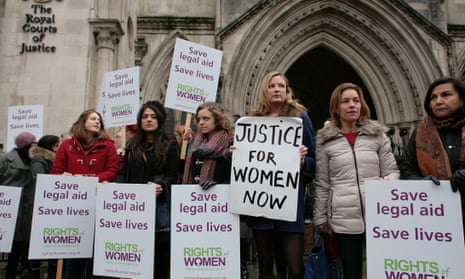Time limits preventing vulnerable victims of domestic violence from obtaining legal aid for court hearings are to be scrapped, the Ministry of Justice (MoJ) will announce.
The widely criticised rules meant victims seeking legal representation in disputed family court hearings, where they could be forced to confront their abuser, had to demonstrate that they had been targeted within the past five years.
Legal Aid Agency regulations also specified that a narrow range of official documents provide proof, such as medical reports, injunctions and social services records.
Statements from organisations working with domestic abuse victims will in future also be accepted as evidence of risk, under the changes revealed on Thursday. Letters from solicitors and information from housing officers will also be sufficient.
Removal of the five-year limit and the admission of fresh categories of evidence will help large numbers of women and also some men who have previously been deprived of legal advice and representation in often embittered family court disputes over custody and contact with children.
The changes were welcomed by organisations, such as the Rights of Women and the Legal Aid Practitioners Group, which campaigned against the restrictions and estimated that 40% of female survivors of domestic violence were unable to meet previous legal aid evidence requirements.
Restrictions on access to lawyers were initially introduced as a cost-saving measure in 2012 by the then justice secretary, Chris Grayling, under the Legal Aid, Sentencing and Punishment of Offenders Act.
Charities, rights groups and organisations working with victims of domestic violence lobbied to remove the limits. The Rights of Women charity has taken several legal challenges against the restrictive regulations to the courts.
The court of appeal heard of a case involving a woman who had been raped and beaten by her former husband, yet had been refused legal aid for a hearing where he was applying for contact with their children.
Other cases cited included an abused wife denied legal aid when she took action to prevent her husband approaching her children’s schools, and a woman denied assistance when she applied to have an abusive forced marriage annulled.
In 2015, the Commons justice select committee produced a highly critical report that found that more than a third of victims of domestic violence could not provide the evidence required to obtain legal aid.
Last year the MoJ extended the time limit of evidence of domestic violence or risk of domestic violence from two years to five.
The decision by the justice secretary, Liz Truss, to relax the legal aid restrictions follows a speech by Theresa May last week that promised a new law to increase prosecutions for domestic violence. The prime minister also pledged to improve the way police deal with victims.
Welcoming the shift in policy, Estelle du Boulay, Director of Rights of Women said: “This is both a victory for women and also for common sense. The purpose of Legal Aid is to ensure everyone in society can equally access safety and justice through the law.
“The current rules are so restrictive that they fail to assist a large number of victims – the majority of whom are women. Our evidence showed that up to 40% of women could not meet the requirements.
“We are hopeful that these changes signal a renewed commitment from Government to address the broader landscape of domestic violence provision more proactively. It is of urgent importance that the Istanbul Convention [against domestic violence] is ratified in parliament tomorrow as this will commit the government to a package of much-needed measures including refuge spaces and prevention work.”
Jenny Beck, Co-Chair of the Legal Aid Practitioners Group said: “The government had committed to protect individuals and families at risk of domestic abuse and yet huge numbers of victims remain vulnerable under the current rules which are needlessly restrictive, confusing and bureaucratic.
“This sensible decision will enable efficient and targeted legal advice and representation to be given to those most in need. Costs, time, and most importantly, lives will be saved. A sensible dialogue to understand the real picture at the coal face has allowed some joined up thinking here which will save both the tax payer and society in general.”
In a separate move, the family courts are expected to announce a further development that will help reduce the suffering of victims of crime.
Under current rules, victims who give prerecorded video testimony of their ordeals in a criminal case cannot present the tape for use as evidence in the family courts. Instead they have to deliver a fresh account, thereby reviving the trauma of their experience.
After the rule change, existing recorded testimony from the crown courts will be accepted.
